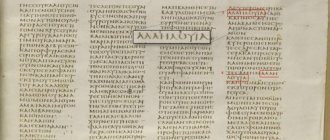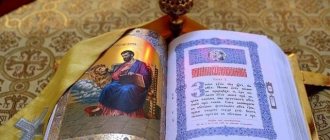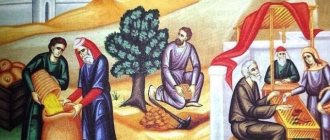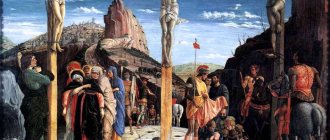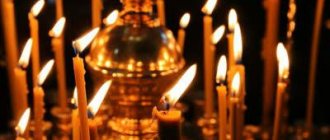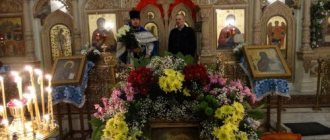Not all believers know the meaning of the word namesake. It sounds quite unusual and at first glance it is not entirely clear what we are talking about. In reality, the name day is the date of memory of the holy person whose name a person was named at baptism (otherwise known as name day).
For Orthodox Christians, name days play a much more important role than birthdays. Let's delve into this concept today, find out how to properly celebrate name days, how they differ from Angel's Day, and what gift would be the most appropriate.
The meaning of a church name for Christians
Find out what awaits you today - Horoscope for today for all zodiac signs
Due to numerous requests from subscribers, we have prepared an accurate horoscope application for mobile phones. Forecasts will arrive for your zodiac sign every morning - it's impossible to miss! Download for free: Daily Horoscope 2020 (available on Android)
The ritual of naming children at birth is as old as the world. Over time, only the meaning of a name in a person’s life has changed: in ancient times, its main function was to distinguish the individual from other members of the community. It was also used to determine the status of the owner and his social position.
Today, many people believe that a name has a serious influence on a person’s destiny. If the parents were wise and were able to choose the right name, then the entire life of the owner will pass easily, he will be protected by luck, and the Lord will bestow his mercy.
And if in ordinary life the main focus of attention falls on the worldly name, then Christian believers, first of all, consider the spiritual name. That is, what was received as a result of the name day. Name day - represents the date of memory of the holy person in whose honor the person was named.
For Orthodox Christians, the tradition of naming has a deep, sacred meaning: they believe that when a baby is baptized, a connection is established between the soul that has come into the world and the Lord. And the holy namesake passes on some of his personal characteristics to the child, and his fate will be much the same.
Namesake: what is it?
In Orthodoxy, this is a day on which the memory of a saint is honored, whose name was received by a person at baptism. On every day of the Orthodox calendar, Orthodox figures and martyrs are commemorated; quite often there can be several of them on one day. When a baby is brought to baptism, it usually receives the name of a saint, whose memory is celebrated on the day of the ceremony. By receiving a name at baptism, a person receives the protection of his heavenly namesake.
Sometimes name days are called “angel’s day,” but this is not entirely true. Saint Theodore of Edessa argued that the Lord gives each person two angels. A guardian angel protects the ward from evil and misfortune, helps to perform good deeds and deeds. People receive a second intercessor after baptism - this is a saint of God. He intercedes before the throne of God, prays for everyone who bears his name. Saint Theodore believed, as did all Orthodox Christians, that the prayers of saints would be heard faster than the prayers of earthly sinners.
How to receive help from a patron saint
Many people ask this question. After all, it can be difficult, and sometimes even unrealistic, for an ordinary layman to follow the path of a saint who dedicated his entire earthly life to serving God. The clergy say the following on this matter:
- Start studying the life of the patron saint - find out what spiritual deeds he accomplished.
- Pray to him every day or simply say words of gratitude. It is believed that the saint hears all the prayers addressed to him from his wards, and always helps them, bestows his protection.
- Keep the Ten Commandments of God, try never to break them and live according to the example of the saint and Jesus Christ - God on earth. Put faith first as opposed to personal conveniences and interests.
Celebration traditions
On the eve of Angel Day, Christians took part in evening worship, confessed and prepared for communion.
On the day of the holiday after the Sacrament of the Eucharist, you need to preserve the joy of unity with God for as long as possible and protect yourself from sinful thoughts and actions. You can gather your family and loved ones at the festive table. Let us all thank God together for the gift of the messenger and for all the good things in life.
Angel Day may fall on a fast day in the middle of the week or fall on a multi-day fast. This means that the treat must comply with the church charter. Or the feast is postponed to a date when there are no food restrictions.
Read also: Turquoise flowers (photo)
The Guardian Angel can and should be remembered not only on the day of baptism. They also turn to him during daily prayers: “Holy Angel of God, my guardian, pray to God for me.”
You can also find an appeal to the Angel in morning and evening prayers. In the morning we ask our heavenly protector to protect us from temptations throughout the day. So that he would pray to the Lord for us for confirmation in faith and salvation of the soul. In the evening we ask our Angel to pray with us for forgiveness of sins committed during the day, for help to be worthy of God’s mercy.
Name day, angel's day and birthday: what's the difference
For ordinary people, all three concepts tend to be confused. In reality this is not true. Let's look at this issue in detail so that you can understand the difference between holidays.
Name Day - celebrated on the date of memory of the holy person whose name the layman bears. On this day, the baby was assigned a heavenly helper, an intercessor who protected him and helped him through life.
Angel Day - falls on the date of the sacrament of baptism over a newborn. At baptism, a guardian angel is attached to the baby, removing all evil from him and motivating him to a righteous, spiritual life.
It turns out that the ritual of baptism bestows two patrons on Orthodox believers at once. Both will invisibly accompany him throughout his life, guiding him towards the light.
Now let's look at the difference in celebrating birthdays and name days (angel day):
- Birthday is celebrated in memory of the arrival of a person’s physical body into the material world. The hero of the occasion receives congratulations and gifts from the guests.
- Angel Day (name day) - celebrated in honor of the memory of the holy person whose name the individual bears, as well as the angelic essence that helps him through life. Believers of this celebration go to the temple and order prayer for their heavenly patron. The day symbolizes the beginning of spiritual life.
Prayer of gratitude to the Guardian Angel
Having thanked and glorified my Lord, the One God of the Orthodox Jesus Christ for His beneficence, I appeal to you, holy angel of Christ, Divine warrior. I appeal with a prayer of gratitude, I thank you for your mercy towards me and for your intercession for me before the face of the Lord. Be glorified in the Lord, angel! Every day we must pray to the Guardian Angel to create a strong connection between us.
Read also: Opal glass tableware: harm or benefit
The prayer to the angel should be sincere and pure. In addition to daily prayer requests, there is a canon to the Guardian Angel.
Troparion:
Save me from all misfortunes and free me from sorrows, I pray you, holy Angel, given to me by God, my good guardian. Illuminate my mind and enlighten me, good one, I pray you, holy Angel, and always instruct me to think about what is beneficial for me.
How to determine the name day date
According to the first, the namesake and baptism days fell on the same date. Therefore, previously newborn babies were baptized on the 8th day after birth, they were given a name according to the Saints - in honor of the saint who was remembered on that date.
Over time, this custom began to gradually fade away; children began to receive names in honor of relatives, famous people, or simply those that their parents liked.
If today you want to figure out how to determine the date of the name day, then you need to know in honor of which holy person you were named. Then open the Saints (a church publication containing the names of all the saints) and find the closest date of memory of this saint, but after the official birthday. Then you can celebrate your namesake.
In the case when your name is not associated with a specific holy man, then the church calendar contains the date of veneration of the celestial being who is your namesake.
Interesting moment! Many saints have several memorial dates in the church calendar. This is why such a concept as “small name days” arose.
Festive table
“How we baked a loaf of bread for [someone’s] name day...” In addition to the loaf, the table had to have dishes with filling - meat, fish, mushroom or vegetable pies, pies, dumplings, pancakes with cottage cheese. The royal name days were celebrated on a special scale, but even on them the central dish was the loaf.
Alexander Polovinkin in his book “Orthodox Spiritual Culture” writes that if a name day falls during fasting, then the entire meal should consist of Lenten treats. However, if Angel Day falls during Lent, then the clergy advises postponing the celebration either to the next weekend, that is, Saturday or Sunday, or to celebrate this important event after Easter, when Bright Week begins.
How name days are celebrated: history and modernity
Since the 17th century, Rus' began to celebrate name days and angel day. For believers, it was of great importance and required special training. But it wasn’t about cooking, like before a regular birthday. After all, name days are a symbol of spiritual birth, establishing a connection with God.
Therefore, they included the following steps:
- In the morning, the whole family went to the temple, where they ordered a prayer for health (it was carried out at the icon of the heavenly intercessor of the birthday boy). Each family member should touch the image with his lips and also light a candle.
- Then the women were busy preparing the festive dinner, and godparents, relatives, friends and neighbors were called to it.
- Godparents deserved special treatment at the holiday. There were many dishes on the table, but the most important of them was the birthday cake.
- At the end of the celebration, each of the guests received a pie and a roll of bread. According to popular belief, the larger the baked goods, the better the owners of the house treated visitors.
Interesting! When name days fell on the date of the fast, they were moved and celebrated on any other date when the fast ended.
In the 20-30s of the 20th century, when Soviet power came, actively fighting against Christianity, instead of the custom of celebrating the namesake, the so-called “Octobers” were introduced. Their symbolism consisted of initiation into Soviet society.
Each child had to be at one of the following stages: an October child, a pioneer, a Komsomol member, a communist and an honorary parent. However, true believers have not forgotten about the ancient Christian ritual of celebrating name days.
And even in the atheistic Soviet years, there were occasional references to the holy holiday:
- the person celebrating his birthday was called the birthday boy;
- in children's literature of that period we come across such expressions as “nowadays Fly is the hopping birthday girl”, “how we baked a loaf of bread on our name day”.
Fortunately, the time of the godless Soviet Union has irrevocably sunk into oblivion. Today, many Orthodox people are gradually returning to the custom of celebrating namesakes.
M
Mavra – dark – Constantinople, deaconess, abbess: Oct. 31 – (Moiseeva), mts.: Il. 28 || Novomuch. – Thebaidskaya, mts.: M. 3Makaria (Saprykina), mts.: D. 26 || Novomuch. - Blessed Macrina of Cappadocia, New, Younger, St.: Il. 19 – dry Mamelkhva Persian, MC: Oct. 5Mamika Gotfskaya, mts.: Mr. 26Manetha of Caesarea (Palestinian), virgin, monastery: N. 13 – this part Margaret – Antiochian – see Marina of Antioch – (Gunaronulo), abbess, monastery: || Novomuch. – (Zakachurina), prmts.: D. 2 || Novomuch. *Mariam, sister of the prophet Moses: || Holy Forefather; Holy Father; Sin.Mariamne (Mary), sister of the Apostle Philip: F. 17 Marina - sea - (Margarita) of Antioch, VMC: Il. 17 – Beria (Macedonian), maiden, recluse, St.: F. 28 Marionilla of Egypt, monastery: Jan. 8Mary - lady - Asiatic, virgin, monastery: F. 6 - Bethany, sister of Lazarus of the Fourth Day: Sunday of St. Myrrh-Bearing Women - Bithynia, St. (who labored in male form): F. 12 – Vladimirskaya, princess, martyr, wife of Prince Vladimir of Vladimir: || Vlad. – (monastically Martha) Vladimirskaya, princess, Venerable: || Vlad. – (Volnukhina), MC.: Oct. 8 || Novomuch. Booth. – (Grosheva), prmts.: Mr. 7 || Novomuch. Booth. – (Danilova), mts.: D. 30 || Novomuch.; Rostov. – Diveevskaya (Fedina), blessed: Av. 26 – (Dmitrievskaya), mts.: D. 2 || Novomuch. – Egyptian, St.: Apostle. 1; 5th Week of Great Lent – (Zhuravleva), prmts.: D. 2 || Novomuch. Booth. – Zaozerskaya, princess: || Volog. – Caesarea (Palestinian), MC.: In. 7 – Cleopas, Jacob, Josiah, myrrh-bearer: Sunday of St. myrrh-bearing women - Constantinople, Palestine, St.: Jan. 26 – Constantinople, patrician, MC: Av. 9 – (Korepova), Spanish: || Novomuch.; Rostov. – (Laktionova), prmts.: D. 26 || Novomuch. – (Lelyanova), nun, prmts.: Ap. 4 || Novomuch. – Magdalene, Equal to the Apostles, Myrrh-Bearer: Il. 22; Week of St. myrrh-bearing women - (Mamontova-Shashina), prmts.: P. 19 || Novomuch. – (Unknown), MC: Av. 5 || Novomuch. - Nikolaevna, Grand Duchess, Passion-Bearer: Il. 4 || Bonfire; Novomuch.; Petersburg – (Nosova), novice, prmts.: Ap. 27 || Novomuch. – Persian – see Golindukha Persian – Persian, mts.: In. 9 – (Portnova), prmts.: || Novomuch. - (monastically Martha) of Pskov, princess, Venerable, wife of St. Dovmont of Pskov: || Pskov. - Radonezh, schema-nun, mother of St. Sergius of Radonezh: Jan. 18; P. 28 || Radonezh; Rostov. – (Rykova), prmts.: P. 15 || Novomuch. - sister ap. Philippa – see Mariamne – (Stephanie), mts.: || Novomuch. – Ustyugskaya: || Volog. – Khidanskaya, St.: Oct. 29 – (Tseitlin), prmts.: D. 2 || Novomuch.Martha - Asian, virgin, MC.: F. 6 - Antioch, Edessa: Il. 4 – Bethany, sister of Lazarus of the Fourth Day: Sunday of St. Myrrh-Bearing Women – Diveevskaya (Milyukova), St.: Av. 21 – (Dudarenko), mts.: || Novomuch. – Cappadocia: S. 1 – (Kovrova), novice, prmts.: Mr. 3 || Novomuch. – Moscow, holy fool for Christ’s sake: || Moscow – Persian, mts.: In. 9 – Persian, Roman, mts.: Il. 6 – Tambovskaya, oxbow, st.: || Tamb. – (Testova), prmts.: Ap. 13 || Novomuch.Mastridia of Alexandria, maiden, pr.: N. 24 – researching Matrona – noble – (Alekseeva), prm.: Mr. 19 || Novomuch. – Amisiyskaya (Pontic), monastery: Mr. 20 – Anemnyasevskaya (Belyakova), Fool for Christ’s sake, Spanish: Il. 16 || Novomuch.; Ryaz. – Ancyra (Corinthian), maiden, mts.: M. 18; N. 6 – (Vlasova), nun, Spanish: Oct. 25 || Novomuch. – (Grosheva), prmts.: Mr. 7 || Novomuch. Booth. – Constantinople, St. (who labored in male form): N. 9 – (Konyukhova), mts.: D. 2 || Novomuch. Booth. – (Makandina), novice, prmts.: Mr. 1 || Novomuch. – Moscow (Nikonova), blessed: Ap. 19 || Moscow; Tul. – (Navolokina), mts.: D. 29 || Novomuch. – Thessalonica (Thessalonian), monastery: Mr. 27Melania of Rome, Bethlehem, Palestine, prp.: D. 31 – black Melitina Marcianopolskaya, mts.: P. 16 – honey Militsa – (Kuvshinova), mts.: Yan. 23 || Novomuch. Booth. - (in baptism Euphrosyne, in monasticism Eugene, in schema Euphrosyne) Serbian, princess: Il. 19Minodora of Vithynia, monastery: p. 10 – gift of the month Myropia of Chios, monastery: D. 2 – making myrrh Mitrodora of Vithynia, monastery: p. 10 – gift of the mother of Michael (Ivanov), schema-nun, prmts.: p. 28 | | Novomuch. But. Moiko Gotfskaya, mts.: Mr. 26Mstislava (Fokina), prmts.: F. 25 || Novomuch.Muse of the Romans, young woman: M. 16
“Themistocluses with Alcides and the crystal bridge across the river” - the opinion of a psychologist
Olga Shurygina, consultant psychologist, St. Petersburg:
– When they give such names to children, some people just want to show off, while others, perhaps, think that “whatever you name the yacht, that’s how it will sail.” It seems to me that when choosing a name, you need to be guided by an ear for music and respect for the child’s future, and not burden him with your cultural meanings or your fantasies about the beautiful life of heroes of epics and tales.
If the name is chosen poorly, the child may suffer. Either you start to dislike yourself and feel embarrassed, or you secretly hate your parents. Nothing good - I wouldn't experiment. And she allowed the authorities to change the problematic name in such cases. But maybe the child will be lucky with his psyche, and he won’t care.
And I don’t think that only Orthodox believers exhibit a craving for exotic biblical names. This is all that Gogol has already described. Remember the sons of Manilov? Themistoclus and Alcides. Claims to education and aristocracy. Meanwhile, he himself has a book on page 14 for two years already. What else can I add to Gogol?!
There are rare cases when they are named after an idol that everyone knows about. And this is not healthy for a child, but at least it’s understandable. We couldn't resist. And in all other cases - Themistocluses with Alcides and a crystal bridge across the river.

